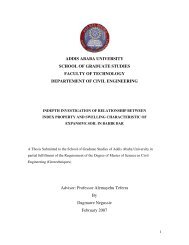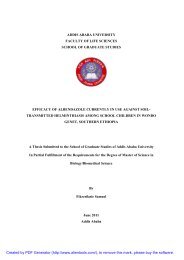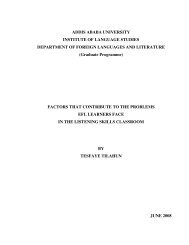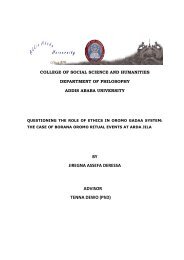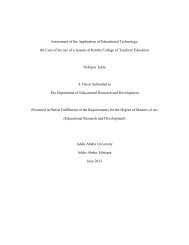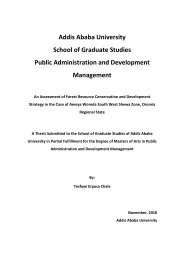AN ASSESSMENT OF WOREDA CAPACITY: THE CASE OF ...
AN ASSESSMENT OF WOREDA CAPACITY: THE CASE OF ...
AN ASSESSMENT OF WOREDA CAPACITY: THE CASE OF ...
Create successful ePaper yourself
Turn your PDF publications into a flip-book with our unique Google optimized e-Paper software.
local agencies; for example, the acquisition of managerial, planning, and technical skills,<br />
knowledge and experience for program planning and implementations; the ability to finance<br />
local economic development initiatives by generating revenues locally and tapping external<br />
resources; and the ability to manage the local economy and initiate development activities within<br />
the framework of national policy goals.<br />
Hence, capacity building or capacity development is the most critical factor for effective local<br />
governance. Capacity development requires local governments to undertake reforms in the way<br />
they conduct their operations, to make investment in human resources and equipment, to adopt<br />
new work practices; and for this efforts to occur, innovation and responsible leadership and<br />
community participation provides the required motivation and the principal elements. Local<br />
capacity development needs, therefore, have to give attention to areas such as staff skills and<br />
professionalization, equipment, materials and buildings, access to adequate financial resources,<br />
organization and the administration‘s planning and execution, local autonomy, creation of<br />
flexible managerial approaches and legal reforms so that the performance of local governance<br />
can improve.<br />
2.4 Decentralization and Capacity Building in Ethiopia<br />
Ethiopia‘s experience in decentralization and local governance is very limited. The country has<br />
been under a highly centralized system with very little powers and responsibilities for local<br />
governments. Local governments in Ethiopia were not autonomous organs with full control over<br />
resources and with adequate decision-making; rather they acted as field agents of central<br />
governments for a long time.<br />
Except for the deconcentrated and delegated forms of decentralization observed during the<br />
previous two regimes, Ethiopia has been a unitary state with strict centralization of authority and<br />
responsibility until 1991. In spite of the existence of woredas and awrajas as sub national tiers<br />
of government structure, their roles in providing public services were limited as the central<br />
government was responsible for providing services at the local level and the local governments<br />
were powerless and could not participate in local development (Mehret, 2002; Vander Loop,<br />
2002; Yigremew, 2001). Under both the Imperial and Derg regime, thus, very little effort was<br />
made to decentralize power.<br />
29





